As Retailers Tentatively Reopen, Vermonters Shop for Sense of Normalcy
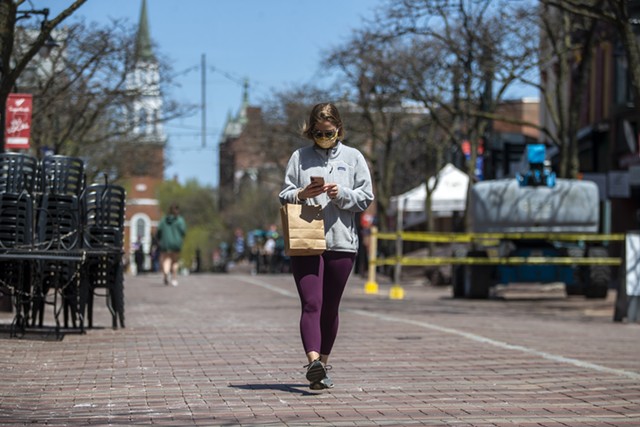
- James Buck
- On Church Street Monday morning
Many Vermont retail stores opened their doors on Monday for the first time since late March, taking their first real step toward recovery since the pandemic paralyzed the state’s economy two months ago.
But while some took advantage of the opportunity, others in Vermont's retail sector were wary of moving too fast.
“We’re all in a really difficult position, where a lot of people in business are probably having to make the decision: Are we going to have to close permanently or open now — and neither choice is good,” Nicole Carey, owner of Birdfolk Collective in Winooski, told Seven Days last week. “I’m too nervous to open Monday. I just want to see how it goes for a little bit longer.”
The state has issued detailed guidance aimed at keeping patrons and employees safe. Businesses must limit the number of customers inside to 25 percent of their legal capacity. They must require employees to wear masks, maintain social distancing and complete a safety training course.
Some business owners and their employees have pushed the state to go further, taking issue with Gov. Phil Scott’s resistance toward requiring customers to wear facial coverings inside stores. Scott recently said that he might consider the move if he finds that people aren’t following the guidelines, but he continues to advocate for an education-first approach. Municipalities, according to the governor, can make stricter rules if they so choose, and Burlington did exactly that Monday night.
 Retailers have scrambled to meet the state’s guidelines, which came out on May 11, the same day that Scott announced they could reopen. With just a week to prepare, many smaller businesses have found it difficult to institute the proper precautions, according to Erin Sigrist, president of the Vermont Retail & Grocers Association.
Retailers have scrambled to meet the state’s guidelines, which came out on May 11, the same day that Scott announced they could reopen. With just a week to prepare, many smaller businesses have found it difficult to institute the proper precautions, according to Erin Sigrist, president of the Vermont Retail & Grocers Association.
“There are a lot of moving parts, and there's a lot of work that goes into setting up that type of a system,” Sigrist said. “It takes a lot of planning and effort and manpower to get back to a position that they can open up.”
Retailers that did reopen Monday took a wide range of approaches. Some gave customers unfettered access to the store, asking only that they adhere to social distancing guidelines and consider wearing a mask. Others, such as Garcia’s Tobacco Shop on Burlington’s Church Street Marketplace, offered expanded versions of the curbside pickup method that has allowed them to remain in business during Scott’s stay-at-home order.
“We technically can allow, like, one or two people in if we wanted to,” said Robert Ronci, the store’s manager, as he manned a table outside, where customers could pick up items. “But we're just taking it slow and being careful.”
Seven Days reporters set out to survey several popular shopping destinations, speaking with customers, employees and business owners about the reopening plan. Here's what we found.
But while some took advantage of the opportunity, others in Vermont's retail sector were wary of moving too fast.
“We’re all in a really difficult position, where a lot of people in business are probably having to make the decision: Are we going to have to close permanently or open now — and neither choice is good,” Nicole Carey, owner of Birdfolk Collective in Winooski, told Seven Days last week. “I’m too nervous to open Monday. I just want to see how it goes for a little bit longer.”
The state has issued detailed guidance aimed at keeping patrons and employees safe. Businesses must limit the number of customers inside to 25 percent of their legal capacity. They must require employees to wear masks, maintain social distancing and complete a safety training course.
Some business owners and their employees have pushed the state to go further, taking issue with Gov. Phil Scott’s resistance toward requiring customers to wear facial coverings inside stores. Scott recently said that he might consider the move if he finds that people aren’t following the guidelines, but he continues to advocate for an education-first approach. Municipalities, according to the governor, can make stricter rules if they so choose, and Burlington did exactly that Monday night.
Related Vermont Retail Stores Can Reopen With Capacity Limits on May 18

Vermont Retail Stores Can Reopen With Capacity Limits on May 18
By Courtney Lamdin
Off Message
“There are a lot of moving parts, and there's a lot of work that goes into setting up that type of a system,” Sigrist said. “It takes a lot of planning and effort and manpower to get back to a position that they can open up.”
Retailers that did reopen Monday took a wide range of approaches. Some gave customers unfettered access to the store, asking only that they adhere to social distancing guidelines and consider wearing a mask. Others, such as Garcia’s Tobacco Shop on Burlington’s Church Street Marketplace, offered expanded versions of the curbside pickup method that has allowed them to remain in business during Scott’s stay-at-home order.
“We technically can allow, like, one or two people in if we wanted to,” said Robert Ronci, the store’s manager, as he manned a table outside, where customers could pick up items. “But we're just taking it slow and being careful.”
Seven Days reporters set out to survey several popular shopping destinations, speaking with customers, employees and business owners about the reopening plan. Here's what we found.
Big-Boxed In
Mona Liguori wasn't having much luck during her first foray back into retail shopping. The two main stores in Williston that she wanted to visit — REI and Marshalls — were both closed, meaning she would have to wait even longer for errands interrupted two months ago.
Many other shoppers who spent their Monday morning in Williston had a similar experience, arriving at the expansive retail plazas only to find that their store of choice was closed. Drivers pulled into parking lots, surveyed the scene and left, realizing a store was closed. Those who needed a little more convincing walked up to read the tiny signs plastered to the windows or simply waved their hand to see if the automatic doors opened.
Even some of the stores that were open provided a far different experience than normal. Those hoping to enter Best Buy, for example, were instead forced to remain in their cars. Store employees — who were dressed in bright yellow vests and communicated with each other using radio earpieces, like a tech-focused Secret Service outfit — approached and asked what the customers needed before disappearing back into the big brick building. Several shoppers eventually left before getting their item, seemingly frustrated by the process.
Liguori, however, wasn’t too concerned about running into dead ends. The only errand she had to complete was a trip to Walmart to pick up her husband’s favorite ice cream. (“He's doing the carb diet,” she explained, “except every once in a while he goes completely off and eats a pound of pasta.")
“It is what it is,” she said, shrugging.
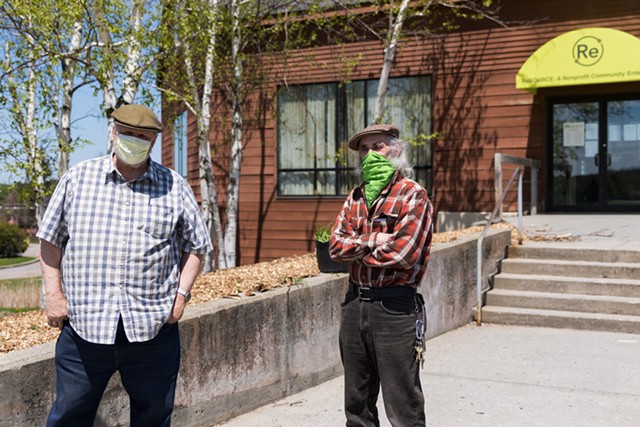 Jim Price and Jim Bengaff had a similar reaction when they both arrived at the locked doors at ReSOURCE, the used furniture store, about 30 minutes later.
Jim Price and Jim Bengaff had a similar reaction when they both arrived at the locked doors at ReSOURCE, the used furniture store, about 30 minutes later.
Price was out hunting for old vinyl records; Bengaff, just old stuff. The two men — both of whom are in their 70s and wore masks and tattered paperboy hats — had never met. But after agreeing to interviews with Seven Days, they spent more time talking with each other than they did a reporter, covering topics like politics, music and food.
"You can talk to strangers if you go to places like this," Bengaff said at one point.
Indeed, when this reporter finally left the scene 15 minutes later, they were still there, chatting away.
Many other shoppers who spent their Monday morning in Williston had a similar experience, arriving at the expansive retail plazas only to find that their store of choice was closed. Drivers pulled into parking lots, surveyed the scene and left, realizing a store was closed. Those who needed a little more convincing walked up to read the tiny signs plastered to the windows or simply waved their hand to see if the automatic doors opened.
Even some of the stores that were open provided a far different experience than normal. Those hoping to enter Best Buy, for example, were instead forced to remain in their cars. Store employees — who were dressed in bright yellow vests and communicated with each other using radio earpieces, like a tech-focused Secret Service outfit — approached and asked what the customers needed before disappearing back into the big brick building. Several shoppers eventually left before getting their item, seemingly frustrated by the process.
Liguori, however, wasn’t too concerned about running into dead ends. The only errand she had to complete was a trip to Walmart to pick up her husband’s favorite ice cream. (“He's doing the carb diet,” she explained, “except every once in a while he goes completely off and eats a pound of pasta.")
“It is what it is,” she said, shrugging.

- Colin Flanders
- Jim Price, left, and Jim Bengaff
Price was out hunting for old vinyl records; Bengaff, just old stuff. The two men — both of whom are in their 70s and wore masks and tattered paperboy hats — had never met. But after agreeing to interviews with Seven Days, they spent more time talking with each other than they did a reporter, covering topics like politics, music and food.
"You can talk to strangers if you go to places like this," Bengaff said at one point.
Indeed, when this reporter finally left the scene 15 minutes later, they were still there, chatting away.
C.F.
Quiet As a Church
Alan Fish arrived at Homeport in downtown Burlington on Monday morning intending to buy a new can opener, though he mostly just wanted to see stores back open.
“To walk down Church Street and see all the stores closed, it's just depressing,” the 72-year-old Burlington resident said. “Now there's some life.”
Emphasis on some: Many businesses on the Church Street Marketplace remained shuttered. And those that did open were met by crowds that would be considered light even had it been the dead of winter.
But for the few local shoppers like Fish who arrived at the pedestrian mall seeking a sense of normalcy, having even a few stores open seemed to do the trick.
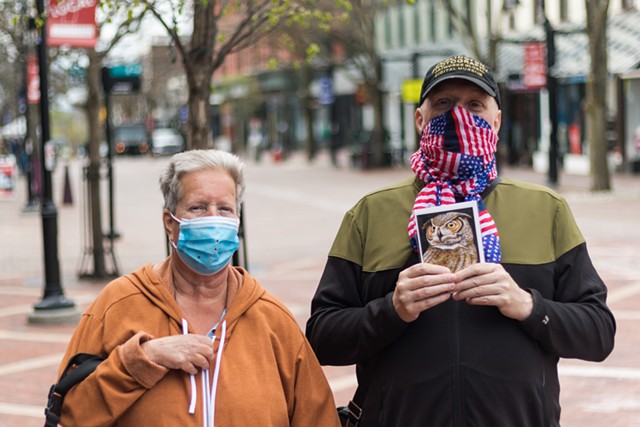
- Colin Flanders
- Rose and David Call
About 10 minutes later, Call’s sister, Rose, walked out carrying a bag of puzzles she’d just bought. “I ran out of things to do during the virus,” Rose said. “You can't go to the store and buy this. You can’t buy that. You can’t buy anything.”
“We’ve been looking forward to having an open store for a long time,” she added.
As the Calls left, Homeport owner Mark Bouchette positioned himself near the entrance, where he said he will spend much of the next week greeting customers and reminding them of social distancing guidelines.
Bouchette said he hopes the retail stores can reopen without trouble and lay the groundwork for other businesses to follow suit.
“It's not just us,” he said. “We need to do it well so that the restaurants can get open. If we don't do a good job — if our customers are not behaving, if we're not able to control our environment — the restaurants aren't going to get their chance.”
“It just has to work,” he added.
C.F.
Times a-Changin' in the Capital
The church bells chimed at 10 a.m. on Monday in Montpelier, as if signaling that it was time for businesses to reopen.
But at State and Main streets, no one was listening. Or, perhaps, retail store owners were tuned to some inner voice and not government guidelines — issued the week before from just down the street — that said it’s OK to reopen with certain conditions.
At the state capital’s main intersection, a bank was closed, as were a bead store, a crafts store and a pizza place. An old bakery storefront remained vacant. A couple doors down Main Street, a children’s clothing store and a bookstore were also shuttered.
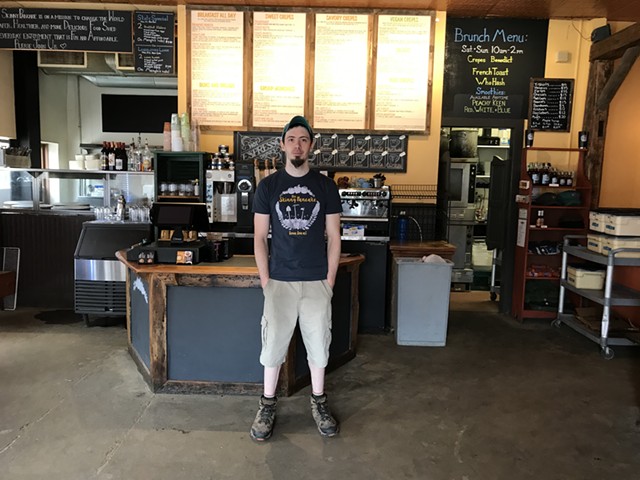
- Sally Pollak
- Chris Morris, kitchen manager of the Skinny Pancake in Montpelier
“I think it’s what’s best for you,” Morris said of the choices made by neighboring businesses. “Ultimately, you got to do what you think is right. I want everybody to feel safe and secure.”
Morris, who lives in Montpelier, said he was hopeful there would be “some semblance of normalcy” in the coming summer months.
“I like to go to shops and support them,” Morris said. “Just like they support us.”
A block or so down State Street, the Book Garden bookshop was open. Owner Brad Carey said he was going to “play it by ear this week” to see if customers are excited to shop or “still a little nervous to go out in public.” The store has a five-person customer limit and asks that customers, like employees, wear masks.
Claire Benedict, co-owner of Bear Pond Books, said by phone that she was considering opening for in-store business later this week. Bear Pond has offered online sales throughout the pandemic.
Many downtown shops had signs in the window promoting their online and curbside business and commitment to social distancing, along with optimistic messages such as “Distance = Hope” and “Love Lives Here.”
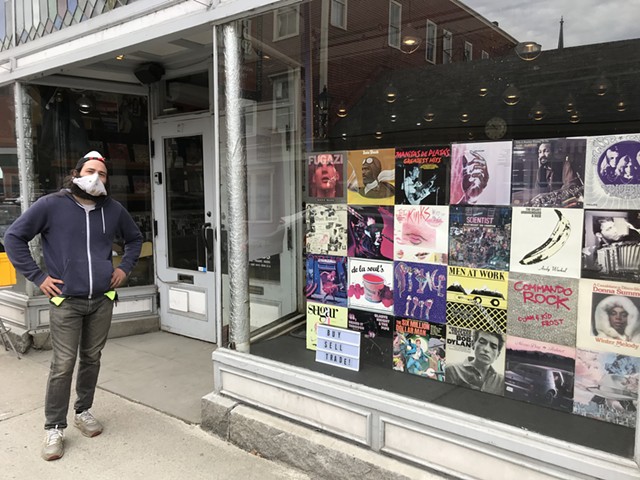
- Sally Pollak
- Xavier Jimenez outside of Buch Spieler Records in Montpelier
Founded 48 years ago, Buch Spieler will open on Saturday for one customer at a time, Jimenez said. Each shopper must wear a mask and gloves (the latter will be available at the store) and will be allowed 30 minutes inside. There will be a 15-minute break between customers, Jimenez said.
“There’s so many different hearts and minds coming at you,” Jimenez said of the considerations about reopening. “We’re taking a close monitor of things.”
The album covers in the store window spoke volumes, even without a record spinning on the turntable: Prince’s 1999, whose title track is about partying into the apocalypse, and Men at Work's Business As Usual (though not these days). But no record could speak a greater truth than Bob Dylan’s third album, on display in the window: The Times They Are a-Changin’.
S.P.
Bullseye
The main doors to the University Mall in South Burlington remained locked on Monday morning, and inside, the halls were dark.
The great retail reopening sweeping the state, it appeared, had skipped this suburban slice of Vermont. A few disappointed customers learned this the hard way when they tugged on the doors. They eventually gave up and walked back to their cars parked in the massive, nearly empty lot.
Not all hope was lost. At the adjacent Target store, the company’s white bullseye logo beckoned would-be shoppers. Since the start of the pandemic, the big-box store has been allowed to stay open and sell essential items such as groceries and cleaning supplies. The governor’s latest order allowed the store to offer up all of its inventory beginning Monday, with customer capacity limits in place.
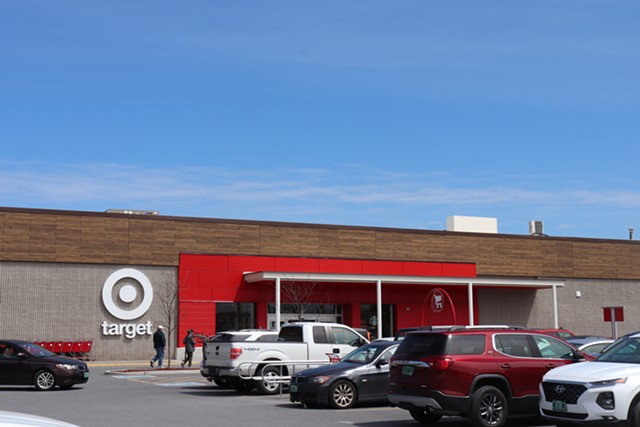 Every employee wore a mask, and most customers did, too, encouraged by signs at the front of the store. The messages urged shoppers to stay home if they had any coronavirus symptoms. Staff sanitized baskets and shopping carts.
Every employee wore a mask, and most customers did, too, encouraged by signs at the front of the store. The messages urged shoppers to stay home if they had any coronavirus symptoms. Staff sanitized baskets and shopping carts.
Around 10:30 a.m., a couple dozen customers flipped through racks of sundresses, browsed sporting goods and wandered the makeup aisles. It resembled any other morning in the store but for the posted signs declaring the fitting rooms closed and advising shoppers to stay six feet apart.
Todd Cornut, who wore a mask and stood near the door in a shirt that signaled he was Target security, said it was less busy than anticipated.
Emma Testone, a preschool teacher who graduated college a few years ago, had a throw pillow and a blanket tucked into her shopping cart. She said she had just moved into a new apartment in Burlington and was excited to shop for decor.
“It feels like I’m doing something I’m not supposed to,” she admitted. She’d been shopping online, including on the Target website, but “it just feels nice to be in the store,” she said.
Like Testone, Laurie Marshall and Fran Farina were more in the market for a feeling of normalcy than any particular Target ware. The two women picked out a red dress for Farina, who told a reporter that she’d been saving a lot of money since in-person shopping was prohibited two months ago.
She and Marshall don’t normally shop at Target. But Marshalls and T.J. Maxx remain closed, and the two wanted to spend a little time together, away from Facebook and “all the negativity” there, Marshall said. They each wore masks — not out of fear for themselves but as a sign of respect for the people and workers around them.
Marshall’s sister, Julie Bevins, appeared with two pairs of clearance jeans. She wasn’t sure whether they’d fit and couldn’t try them on without fitting rooms.
But Marshall knew of a trick. She draped the waistband of the jeans around Bevins’ neck, trying to get them to touch in the back.
“Those will fit!” Marshall declared.
Bevins didn’t seem fully convinced, but the jeans were only $7, anyway. Sold.
Farina, though, put the red dress back on the rack. Her retail therapy would have to wait.
The great retail reopening sweeping the state, it appeared, had skipped this suburban slice of Vermont. A few disappointed customers learned this the hard way when they tugged on the doors. They eventually gave up and walked back to their cars parked in the massive, nearly empty lot.
Not all hope was lost. At the adjacent Target store, the company’s white bullseye logo beckoned would-be shoppers. Since the start of the pandemic, the big-box store has been allowed to stay open and sell essential items such as groceries and cleaning supplies. The governor’s latest order allowed the store to offer up all of its inventory beginning Monday, with customer capacity limits in place.

- Margaret Grayson
Around 10:30 a.m., a couple dozen customers flipped through racks of sundresses, browsed sporting goods and wandered the makeup aisles. It resembled any other morning in the store but for the posted signs declaring the fitting rooms closed and advising shoppers to stay six feet apart.
Todd Cornut, who wore a mask and stood near the door in a shirt that signaled he was Target security, said it was less busy than anticipated.
Emma Testone, a preschool teacher who graduated college a few years ago, had a throw pillow and a blanket tucked into her shopping cart. She said she had just moved into a new apartment in Burlington and was excited to shop for decor.
“It feels like I’m doing something I’m not supposed to,” she admitted. She’d been shopping online, including on the Target website, but “it just feels nice to be in the store,” she said.
Like Testone, Laurie Marshall and Fran Farina were more in the market for a feeling of normalcy than any particular Target ware. The two women picked out a red dress for Farina, who told a reporter that she’d been saving a lot of money since in-person shopping was prohibited two months ago.
She and Marshall don’t normally shop at Target. But Marshalls and T.J. Maxx remain closed, and the two wanted to spend a little time together, away from Facebook and “all the negativity” there, Marshall said. They each wore masks — not out of fear for themselves but as a sign of respect for the people and workers around them.
Marshall’s sister, Julie Bevins, appeared with two pairs of clearance jeans. She wasn’t sure whether they’d fit and couldn’t try them on without fitting rooms.
But Marshall knew of a trick. She draped the waistband of the jeans around Bevins’ neck, trying to get them to touch in the back.
“Those will fit!” Marshall declared.
Bevins didn’t seem fully convinced, but the jeans were only $7, anyway. Sold.
Farina, though, put the red dress back on the rack. Her retail therapy would have to wait.
M.G.
Related Stories
-
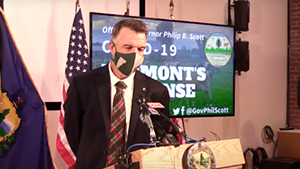
Scott: Masks Required in Public Beginning August 1
by Kevin McCallum July 24, 2020
-
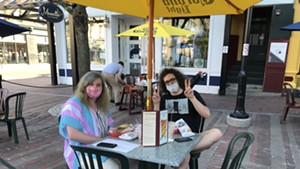
Vermont Expands Capacity Limits for Restaurants, Event Spaces
by Courtney Lamdin June 19, 2020
-
Letters to the Editor (6/3/20)
by Seven Days Readers June 3, 2020
-
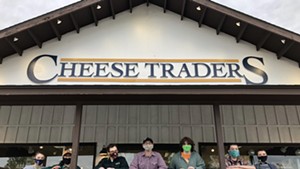
Vermont Retailers Incentivize Customers to Mask Up
by Melissa Pasanen June 2, 2020
-
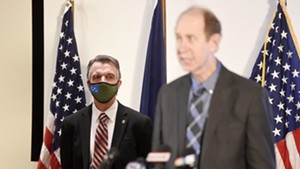
'Close Contact' Businesses Can Reopen June 1; Gathering Size Expanded
by Courtney Lamdin May 29, 2020
Speaking of...
-

Court Rejects Roxbury's Request to Block School Budget Vote
Apr 24, 2024 -

Q&A: Downtown Montpelier Transforms Into PoemCity Every April
Apr 24, 2024 -

Video: Visiting the Kellogg-Hubbard Library’s PoemCity in Montpelier During the Month of April
Apr 18, 2024 -

Q&A: Catching Up With the Champlain Valley Quilt Guild
Apr 10, 2024 -

Video: 'Stuck in Vermont' During the Eclipse
Apr 9, 2024 - More »





Comments
Comments are closed.
From 2014-2020, Seven Days allowed readers to comment on all stories posted on our website. While we've appreciated the suggestions and insights, right now Seven Days is prioritizing our core mission — producing high-quality, responsible local journalism — over moderating online debates between readers.
To criticize, correct or praise our reporting, please send us a letter to the editor or send us a tip. We’ll check it out and report the results.
Online comments may return when we have better tech tools for managing them. Thanks for reading.